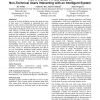Free Online Productivity Tools
i2Speak
i2Symbol
i2OCR
iTex2Img
iWeb2Print
iWeb2Shot
i2Type
iPdf2Split
iPdf2Merge
i2Bopomofo
i2Arabic
i2Style
i2Image
i2PDF
iLatex2Rtf
Sci2ools
126
click to vote
CHI
2007
ACM
2007
ACM
How it works: a field study of non-technical users interacting with an intelligent system
In order to develop intelligent systems that attain the trust of their users, it is important to understand how users perceive such systems and develop those perceptions over time. We present an investigation into how users come to understand an intelligent system as they use it in their daily work. During a six-week field study, we interviewed eight office workers regarding the operation of a system that predicted their managers' interruptibility, comparing their mental models to the actual system model. Our results show that by the end of the study, participants were able to discount some of their initial misconceptions about what information the system used for reasoning about interruptibility. However, the overarching structures of their mental models stayed relatively stable over the course of the study. Lastly, we found that participants were able to give lay descriptions attributing simple machine learning concepts to the system despite their lack of technical knowledge. O...
CHI 2007 | Human Computer Interaction | Keywords Intelligent Systems | Mental Models | Six-week Field Study |
Related Content
| Added | 30 Nov 2009 |
| Updated | 30 Nov 2009 |
| Type | Conference |
| Year | 2007 |
| Where | CHI |
| Authors | Joe Tullio, Anind K. Dey, Jason Chalecki, James Fogarty |
Comments (0)

